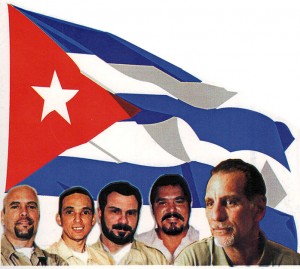Cuba, Ebola & the Cuban 5

Gerardo Hernández Nordelo, Antonio Guerrero Rodríguez, Fernando González Llort, Ramón Labañino Salazar, and Rene González Sehewert.
Revolutionary leader and former Cuban President Fidel Castro’s Oct. 17 reflection, “Duty calls,” explains Cuba’s urgent mobilization of medical personnel “to combat the brutal epidemic outbreak in Western Africa.” (Read the entire article at tinyurl.com/pta4u4k)
He notes that calling on highly qualified staff to fulfill a risky task “is something far more difficult than sending soldiers to fight and even die for a just political cause.”
This effort surpasses by many times the mission against terror undertaken by the Cuban 5 in the early 1990s, but the willing self-sacrifice to take on a complicated and risky task to save the lives of others is the same.
Antonio Guerrero, Ramón Labañino and Gerardo Hernández, who remain in U.S. prisons after 16 years — along with their comrades René González and Fernando González, who served their full, unjust sentences and returned to Cuba — appeared to renounce the revolution they love in order to infiltrate the violent, Miami-based thugs bombing Cuban hotels and restaurants. Their efforts, however, thwarted an airline explosion, revealed a boatload of explosives docked in the highly populated Miami river area and protected their vulnerable homeland while it struggled to restructure its economy after losing its primary trading partner, the Soviet Union. This extremely painful, imposed restructuring process did not close even one hospital or school.
At the same time, Cuba managed to expand its free, prevention-oriented health care system by instituting a neighborhood-based family doctor-and-nurse program which covered more than 98 percent of its population by 1999. By 2010, Cuba’s physician-to-patient ratio was 1 to 150, more than double the 1 to 400 ratio existent in the U.S. in 2011. (data.worldbank.org/country/cuba)
The corporate media, including “The Hill,” a Washington-based publication focusing on U.S. political news in the country’s capital, are headlining Fidel’s statement, “We will gladly cooperate with the U.S. staff in this endeavor, not in the pursuit of peace between the two States which have been adversaries for so many years, but, in any case, for world peace, which is a goal that could and should be pursued.” (tinyurl.com/qgdkzr2)
Cuba’s principled internationalism that puts human life first is nothing new. The media haven’t noted that August 2015 will be the tenth anniversary of Cuba’s offer to send 1,586 fully equipped, disaster-trained medical personnel to the hurricane flooded New Orleans.
Rebuffed by the U.S. federal and state governments, many of the Cuban personnel then set up medical facilities to serve earthquake survivors on the hillsides of the Himalaya mountains of U.S. ally, Pakistan. Nor are the media noting that U.S. students are presently training in Cuba to be doctors, to return, upon completion of their studies, to practice medicine in their underserved U.S. communities.

